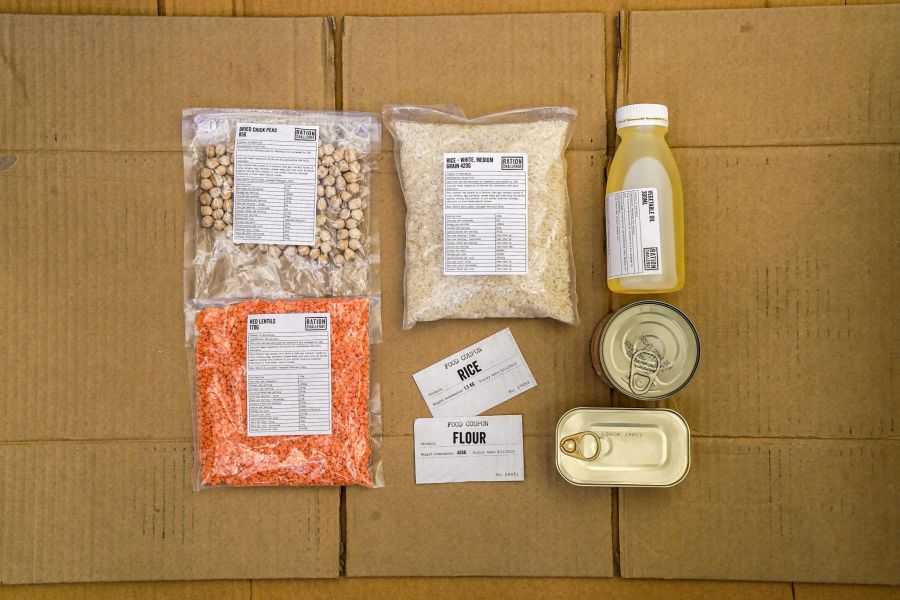
When Una Lappin sends me her unboxing video for the Ration Challenge, I rewatch it three times in shock.
She is unpacking the food a Syrian refugee in a camp in Jordan might survive on for seven days. Lappin takes the foods out one by one. There are seven items and she’s finished in 30 seconds.
The rations are based on the food packs given out in refugee camps and the challenge asks people to raise money by living off this pack for a week. It includes just under 2kg of rice, 400g flour, 170g lentils, 85g dried chickpeas, a small tin of sardines, a tin of kidney beans and 330ml vegetable oil. Some of the 656,000 Syrians living in Jordanian camps might live off this kind of pack for months.
“After a few days you get what I call ‘rice brain’,” says Peter Anderson, Concern Worldwide’s Northern Ireland director who introduced the challenge to the UK last year, partnering with Australia’s Act for Peace. “What it really brings home is the blandness of the food and the lack of variety.”
When we speak, Anderson is on day one of his 2020 challenge, which this year runs from 13 to 19 September.
“Last year all I could smell was food,” remembers Lappin, who is also sitting down to a week of rice and lentils for the second time. “I was tired, my speech slurred and my concentration went. My eldest made a mistake with the falafel and said, let’s make it again. I had to explain to him that we couldn’t, that this was all I had.”
Last year Lappin, who has worked as a nutritionist in Niger with Concern Worldwide, raised £1,300. This year she is participating with a team and focusing on raising awareness.
It’s a tough time to be asking people for money but while this year’s Ration Challenge was postponed and a lower turnout is expected, it’s on track to raise £1.2m compared to £1m in 2019.
It’s no ice bucket challenge, which went viral in 2014 and raised £168m for ALS, also known as motor neurone disease. It emerged that some participants had little idea what they were raising money for but that doesn’t invalidate their efforts. “They were showing ‘helping behaviour’ which has been recognised as important for fundraising,” says Stephen Lee, professor of voluntary sector management at Cass Business School’s Centre for Charity Effectiveness.
“People run the London marathon for charity just to get a place,” says Anderson. “For this, they’ve got to have an affinity with the cause and what you do is relevant. Although we would never claim that taking part in the challenge is anything like a refugee’s experience, it does give a small insight into one of the challenges refugees face.”
According to the World Food Programme, the number of people facing life-threatening food insecurity will double this year to 265 million.
“Without the ability to demonstrate and establish empathy it becomes much harder to have a resonant impact,” says Lee. “They [Concern Worldwide] are pulling together two tried and tested motivational formats for fundraising.
“The first is a challenge. The second is bringing people together around a week of concerted action. Being able to provide a concrete sense of urgency within a set time and place galvanises activity and focuses the mind.”
A comparable challenge is the upcoming Wildlife Ranger Challenge in support of rangers across Africa who risk their lives for endangered species. The global initiative, supported by Sir David Attenborough, asks runners to put on a 25kg pack and run five, 10 or 21km in solidarity with 50 teams of rangers who will run a half marathon on 3 October.
According to the Institute of Fundraising, UK charities expect an overall income loss of 24 per cent, or £12.4bn, over the year ahead because of Covid-19. The plight of refugees is one of many causes to suffer but access to food is the common ground linking all low-income groups across the globe. “The obsessive focus on Covid in nearly every media and governmental campaign has pushed other hugely pressing issues out of the limelight,” says David Labi, who runs Good Point, an ethical storytelling agency which works with cause-driven brands and campaigns. “We need to start returning focus to greater challenges like climate devastation and forced migration.